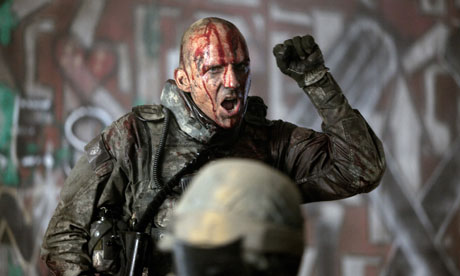
There's a fierce critical intelligence at work in Ralph Fiennes's new adaptation of Shakespeare's Coriolanus, set somewhere like the war-torn Serbia of the 1990s, a world of rolling TV news, image management and cynical deals cut in smoke-filled rooms. Fiennes makes a powerful case for Coriolanus as an essential, contemporary drama, about democracy, class war and the nation state. It reaches back to the Yugoslavian conflict, and the point is not just to satirise nationalist bullies and butchers, but also the smoothly indifferent mandarin class of western Europe in that era. The film also resonates with the Arab spring, where democratic gains can be annulled by the military. Fiennes directs and stars as the professional soldier lionised by Rome's ruling class for his attack on the threatening Volscian army, led by Tullus Aufidius (Gerard Butler), and lavished with praise by his formidable mother Volumnia, a charismatic, imperious performance from Vanessa Redgrave. But he is fatally persuaded to run for civilian office as a consul; and, unable to conceal his contempt for the plebeian mob, Coriolanus is forced into exile and then offers his services to Rome's bitterest enemy, Tullus. Fiennes's dead-eyed, dust-smudged, blood-smeared face looks very much like Klaus Maria Brandauer in Mephisto. He has a fanatical, mesmeric stare that subdues everyone – except his mother, whose ferocity nurtures yet exceeds his. The TV news motif works well, though I have to say that the cameo from Channel Four's Jon Snow is a gimmicky misjudgment. It reminded me of Tony Blair's appearance for Comic Relief with Catherine Tate. This is a minor flaw in an extremely smart film.

